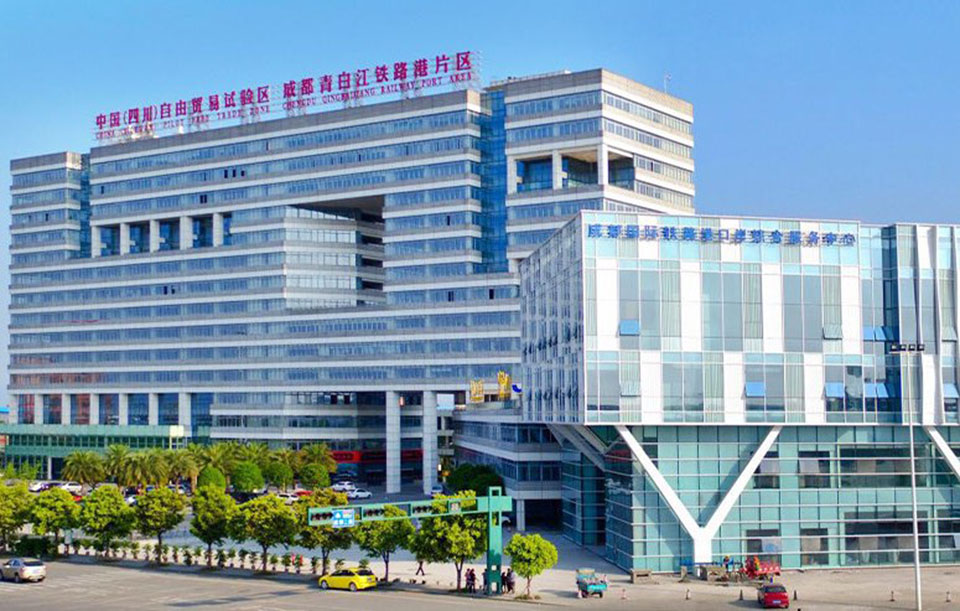
OR
Chengdu Int'l Railway Port wants Nepal to launch its pavilion there
Published On: December 31, 2019 07:17 AM NPT By: Aditi Baral

CHENGDU, Dec 30: The Chengdu International Railway Port which has established a new model of the modern service industry in Sichuan Free Trade Zone, has wished for Nepal to set up a National Pavilion there as other countries have done. At present, this port has allotted space for six pavilions of different nations, while 13 other nations have already signed contracts to establish their national pavilions to showcase their products.
Officials at the Port Management Committee said they genuinely want Nepal to be part of this port, which still has space for 25 other countries to open their national pavilions. “We don't have a pavilion for Nepal yet. But we really hope to see Nepal opening one of its pavilions here in our port,” said one of the members of the Port Management Committee, Zeng Yi.
Located in the central part of Chengdu City, this railway port is said to be at a strategic point of the Silk Road Economic Belt and the Yangtze River Economic Belt. Over the years, this place has emerged as a platform to launch various activities that are part of China's ambitious Belt and Road Initiative (BRI) and also as a center to implement the strategy for an integrated development of all districts which lie in Sichuan Province.
The China Railway Express (Chengdu), which operates from Chengdu International Railway Port, links Chengdu with 39 different cities including 25 overseas cities. The port has a total seven international railway channels and five other international rail-sea combined channels.
The Port Management Committee member Zeng said that Nepali products, especially handmade products are one of the most sought-after products in China because of their unique appearance in the international market. “Nepal is an important neighboring country for China and also a part of the Belt and Road Initiative. So, opening a separate national pavilion of Nepal at the port will be of benefit to both the nations,” she said.
The six pavilions, which have already been established at the port, have been selling various goods such as food and drinks, daily chemical products, building materials, handbags, accessories and kitchenware imported from their home countries in various parts of Europe. Over the years, the port has already emerged as a hub to connect people who want to buy products of different countries.
“If we open a different pavilion of Nepal prioritizing mostly handmade Nepali products, it will surely stand out to be one of its kinds and will also help in the publicity of Nepali products,” Zeng further said. “The space is already here and we are just waiting for nations like Nepal to get involved and showcase their unique products here.”
The port carries huge significance for businesses and promotion of national products as it draws a huge number of high-level dignitaries including politicians, government officials, heads of multi-national businesses and tourists from both China and abroad. They not only observe these products from different countries displayed in these pavilions but also buy them as souvenirs.
The Pavilion Project has offered a platform to interested countries and companies to run international trading businesses. “Because of China Railway Express in Chengdu, we have been able to build a strong connection with other countries,” said Project Manager at the Railway Port, Tan Shiyuan. “It is also a stage for these companies to present the culture of different countries and have an opportunity to promote cross-border communication.”
However, there are a few criteria a nation has to meet to establish its national pavilion at the port. Any country interested in opening a pavilion should first get an authorization from a state-level institution of their home country. The Port Management Committee has offered site support for years to the projects of national pavilions with a lease term of more than three years.
Should they want to open a Class I type of pavilion, the interested party will require authorization from the central government or its constituent departments, while Class II type pavilion will require authorization from the state government, municipal government or their constituent departments of their home country. Those opting to open a Class III type pavilion will require just an official authorization from well-known business associations where it is located.
You May Like This

Indian customs releases trucks carrying Nepali tea, halted across Kakarbhitta
BIRATNAGAR, April 24: The Indian customs released the trucks carrying Nepali tea on Tuesday night. The cargo trucks had been... Read More...

NEPSE inches up 0.15 points; daily turnover increases to Rs 2.53 billion
KATHMANDU, April 24: Nepal Stock Exchange (NEPSE) on Wednesday increased slightly by 0.15 points to close at 1,969.17 points. ... Read More...

Gold price rises by Rs 500 per tola
KATHMANDU, April 24:The price of gold has increased by Rs 500 per tola on Wednesday, following a decline earlier in... Read More...




Just In
- Health ministry to conduct ‘search and vaccinate’ campaign on May 13
- Indian customs releases trucks carrying Nepali tea, halted across Kakarbhitta
- Silent period for by-election to begin from midnight
- SC issues short-term interim order to govt and TU not to take immediate action against TU legal advisor Khanal
- National consultation workshop advocates to scale up nutrition smart community in Nepal
- Patan High Court issues short-term interim order to halt selection process of NTB’s CEO
- NEPSE inches up 0.15 points; daily turnover increases to Rs 2.53 billion
- Bagmati Govt mandates tri-lingual signboards in offices














Leave A Comment